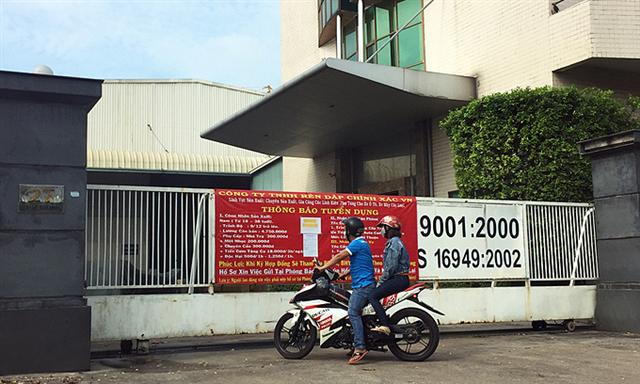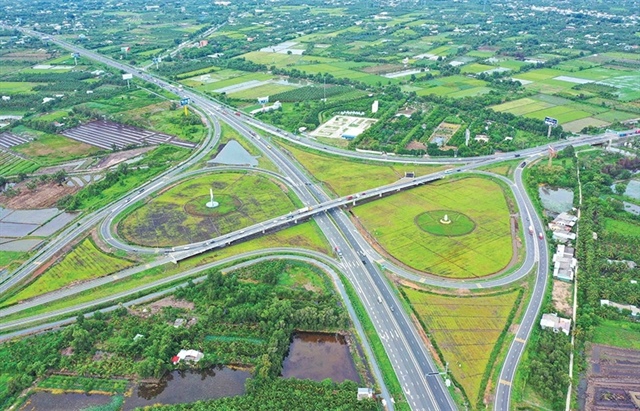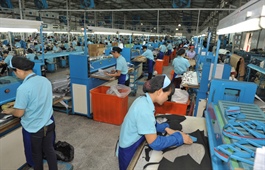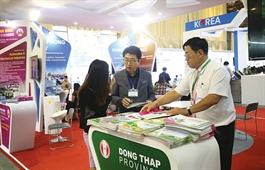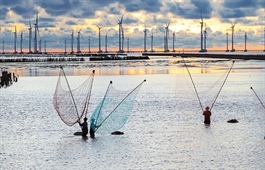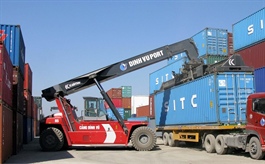Few takers for jobs in major industrial hubs
Few takers for jobs in major industrial hubs
Despite offering high salaries and attractive benefits, many firms in HCMC and nearby industrial hubs like Binh Duong and Dong Nai are finding it hard to recruit new employees.
People read a recruitment notice in front of a company in Vietnam-Singapore industrial park in Binh Duong Province, March 2021. Photo by VnExpress/Le Tuyet.
|
Needing to expand its production, Taiwanese-invested Virtue King Vietnam Company, which produces backpacks and other bags at the Song Than Industrial Park in Binh Duong Province, has been looking to hire 2,000 employees since late last year.
The company offers a minimum monthly salary of VND5 million ($215.98), plus a VND1 million allowance. High performance will be rewarded with an additional VND5 million each month.
Despite this recruitment policy, considered attractive among businesses in the area, the company has so far only recruited over 600 people.
South Korean textile firm Taekwang Vina in Dong Nai, home to 35,000 workers, is also looking for 2,000 people to work on four additional production chains this year.
The company offers a minimum monthly salary of VND7 million ($304) and bonus and welfare policies but it has not yet recruited enough workers.
According to official data, over 600 companies in Binh Duong, a major industrial hub in southern Vietnam, need to recruit about 100,000 workers in the first quarter. In HCMC, the estimated need is for 300,000 workers this year while neighboring Dong Nai Province wants to hire around 40,000 employees.
However, very few businesses in these localities are able to recruit enough people as planned despite hosting a bunch of industrial parks.
Explaining the recruiting difficulty, Nguyen Thanh Can, chairman of the labor union of Virtue King Vietnam Co., Ltd., said several localities have built industrial parks in their own neighborhood, giving priority given to locals.
Recently, more than 300 workers of the company returned to their hometown for the Tet break but did not return. Some chose to stay put in their hometown and apply for jobs in factories near their home even though the salary would be not as high as in major industrial hubs; while others shifted to farming work, tired of paying high house rents while not having stable jobs.
Several localities have boosted investments in industrial parks and related infrastructure in order to prepare for new foreign investors looking to shift their operation to Vietnam.
Le Tran Thanh Hai, a senior official of a major garment firm in HCMC, said with the latest Covid-19 outbreak under control and increasing orders, many companies are in dire need of new employees.
However, the pandemic has also seen workers lose their jobs and other means of livelihood. Many have returned to their hometown to find new jobs. Now, they are fearful of returning to major industrial parks because of possible outbreaks.
Ngo Duy Hieu, vice chairman of the Vietnam General Confederation of Labor, said that in order to attract workers, businesses need to continue to boost working conditions, adjust wage policies and improve workers’ welfare.
The unprecedented impacts of the Covid-19 pandemic saw an estimated 32.1 million Vietnamese workers aged 15 or above either lose their jobs or have their working hours reduced in 2020. The average monthly income last year was just VND5.5 million ($236.52), down 2.3 percent over the previous year.


